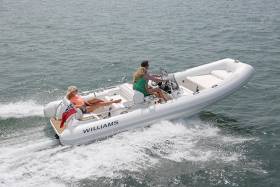Displaying items by tag: Jet
Williams Jets Tenders Invests In Boat Builders of the Future
Oxfordshire-based Williams Performance Tenders in the UK is has announced it will once again be giving local students the chance to take part in its innovative training scheme. Now in its fourth year, the course offers young people a fantastic chance to gain valuable practical experience in the marine industry, as well as have the opportunity to become an apprentice with the global-leading brand.
10 young people from schools in Oxfordshire have been selected to attend the five-week Powerboat Workshop course. The practical sessions, which kick off on 23rd April are designed to give young people the chance to learn life-long skills that can be used in future employment, and to teach them more about the sector where Williams Jet Tenders is recognised as a global leader.
The sessions will culminate in an exciting race day at Williams’ test lake on 21st May. Last year, 10 young people enjoyed a fantastic day racing model speed boats of their own designs on the water, and were also given the opportunity to go for a spin as a passenger in one of Williams’ sporty jet tenders.
One attendee from last year’s event was John Howell, MP for Henley who really enjoyed the event and recognised the value the course can bring to young people in Oxfordshire, commenting: “I was so impressed with last year’s event and what the young people had achieved. This really is a fantastic initiative that Mathew and John have set up that is really giving young people a great chance of a career, as well as investing in the future of the industry. I am looking forward to seeing what the students achieve this year and to another thrilling end of course race.”
As in previous years, one of the participants from the course will also be given the opportunity to start work as an apprentice at Williams – underpinning the brand’s commitment to investing in the boat builders of tomorrow. Two young apprentices are already employed at the factory which continues to grow in response to increased global demand.
The scheme was started by brothers Mathew and John Hornsby, founders of Williams Jet Tenders, and is run in partnership with Employment Action Group.
Mathew Hornsby, Sales Director at Williams Performance Tenders, commented: “It’s always been important to John and I that we help to nurture and invest in the boat builders, designers and engineers of our future. We have been so impressed with the calibre of the students, as well as their dedication and hard work over the past three years, and we have high hopes for the young people taking part this year.
“The apprentices that we’ve hired over the past few years are working out really well and it’s fantastic to see them grow in their role here at Williams. Our past students have all really enjoyed the course, particularly the race day at the end, as it gives them a chance to see everything we’ve taught them about designing and building boats in action.”
Founded by brothers Mathew and John Hornsby in 2004, Williams Jet Tenders has established itself as the world’s leading jet tender specialist, renowned for its range of Turbojet, Dieseljet and Sportjet models. The company is launching a new range in 2016, the MiniJet. Williams Jet Tenders now employs 60 staff at its Oxfordshire base, and is supported by a global team of factory trained engineers.






























































